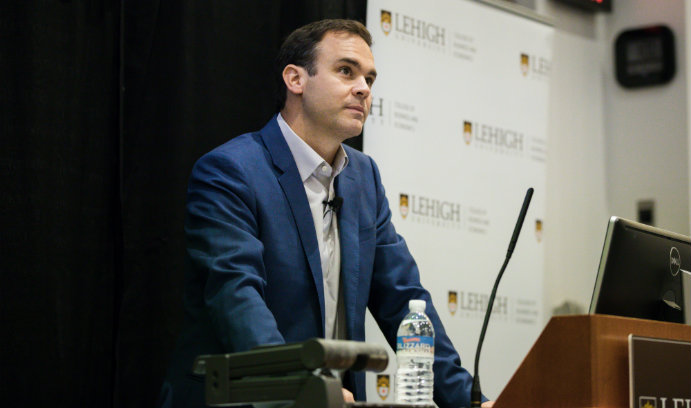Cornell Introduces Grade Non-Disclosure – New York News

Let’s explore some of the most interesting stories that have emerged from New York business schools this week.
Johnson Students Vote to Enact Grade Non-Disclosure – Johnson Business Feed
After a year-long study initiated by Johnson’s Student Council to “evaluate the alignment of academics and recruiting,” Cornell Johnson students have “voted to enact a policy of grade non-disclosure” in which Two-Year, One-Year, and Johnson Cornell Tech MBA students need not “disclose their grades to recruiters until after a full-time, post-graduation job offer has been extended.”
Associate Dean for MBA Programs Vishal Gaur writes “We hope that grade non-disclosure will encourage students to take more academic risks and think holistically about their education, personal development, leadership, and the impact they want to have in the future.”
Victoria Wilmarth (MBA ’18), who is now Brigham and Women’s Hospital’s Deland Fellow in Hospital Administration believes “the vote will strengthen the school’s collaborative community.”
“This vote helps bring Johnson’s academic experiences into alignment with the school’s values. I think this will deepen students’ commitment to collaborative learning and support academic risk taking for professional and personal development.”
You can read the entire Johnson Business Feed article here.
Five New Faculty Bring Mix of Research Insight, Corporate Experience to Business School – Stevens Institute of Technology School of Business News
For the 2018-19 school year, the Stevens Institute of Technology School of Business welcomed five new professors, all of whom are well equipped to help students “think critically about technology’s role in solving business problems.”
- Assistant Professor Apostolos Filippas: “Research interests include business analytics, natural language processing, data science, online platforms and market design.”
- Assistant Professor Pranav Garg: “Studies human capital, organizational design and learning, and strategy.”
- Associate Professor Anand Goel: Formerly a Director with Navigant Consulting whose “corporate experience is enhanced by research work that has been featured in many top journals, including the Journal of Financial Economics, Review of Financial Studies, and Journal of Finance.”
- Assistant Professor Majeed Simaan: Research interests include “banking and risk management, financial networks and interconnectedness, and portfolio theory and asset allocation.”
- Assistant Professor Jordan Suchow: Formerly a “research scientist with the Berkeley Artificial Intelligence Research Lab at the University of California–Berkeley.”
You can find out more about the new hires here.
New York Times‘ David Gelles: ‘When CEOs Speak Out, the World Listens’ – Lehigh College of Business Blog
New York Times business reporter David Gelles used his keynote speech at the recent Lehigh University College of Business and Economics 2018 Impact Symposium to posit “companies can no longer afford to sit on the sidelines when it comes to the hot button issues of the day.”
“On topics ranging from climate change to health care, gun laws to birth control, the biggest brands in the country are being forced to take a stand. It’s hard to state what an abrupt change this is,” he explains.

Gelles at the recent Lehigh University College of Business and Economics 2018 Impact Symposium / Photo via Christa Neu
He adds, “Until recently, companies avoided controversy at all costs. But these days, they are confronting it head on, sometimes even embracing it when it arrives unexpectedly, and in rare instances, seeking it out.”
Gelles points to Salesforce founder and CEO Marc Benioff’s threat to relocate its Indiana office in response to a 2015 law that would have “made it easier for religious conservatives to refuse service to gay people.”
Gelles explains, “Being a chief executive no longer means just running a profit and loss statement. It means being prepared to articulate your values—and your company’s values—when you least expect it. When CEOs speak out, the world listens. Sometimes, policies even change.”
You can read more about Gelles’ speech at Lehigh here.
How to Turn an MBA into a Career with Tesla

Tesla, Inc. founder and the tech entrepreneur world’s newest shining beacon Elon Musk, a graduate of the Wharton School at the University of Pennsylvania, once pessimistically said, “As much as possible, avoid hiring MBA’s. MBA programs don’t teach people how to create companies … our position is that we hire someone in spite of an MBA, not because of one.” Continue reading…
More Tech Hires at Kellogg, Per 2016 Employment Report

‘Tis the season for MBA employment reports, and one of the latest schools to share details about how its most recent class of graduates fared in their quest for jobs is Northwestern’s Kellogg School of Management. Released in its entirety last week, the report shows a surge of graduates heading off toward technology firms—22 percent of the class, up from 15 percent last year.
“I do think the tech story jumps out,” says Liza Kirkpatrick, director of career management for the full-time MBA program. “But we really are very proud of this year’s employment outcomes overall.” She went on to cite the fact that 96 percent of students received an offer within three months of graduation, up slightly from 95 percent the year before. The median base salary was $125,000, up $2,000 from the year before.
Consulting, long the destination for the majority of Kellogg grads, still drew one in every three—33 percent—though this represents an ever-so-slight dip from the 35 and 36 percent in each of the past four years. Financial services, which drew 19 percent of last year’s class and 20 percent two of the three years before that, dipped to just 13 percent this year, the most significant downward shift of any industry.
According to Kirkpatrick, the drop off in financial services could be nothing more than a reflection of the aspirations of this particular class. “We look at it as just an indication of the interest of the Class of 2016,” she says, noting that 14 percent of the class took finance internships during the summer between their first and second years, in line with the 13 percent who took full-time offers.
Not Surprisingly, Salaries Highest in Consulting, Financial Services
Though student interest in financial services is lower than it has been, it’s certainly not because of waning paydays. The highest starting salary of the class—$250,000—went to a graduate going into private equity. Median starting salaries for students headed into financial services were $125,000. Overall, consulting led the way in terms of pay, with a median starting salary of $145,000 for these graduates.
Technology trailed slightly, with a median starting salary of $120,000, although Kirkpatrick was quick to point out that salaries for those entering more technical roles at technology firms remain very high. “The more technical your skills are, the higher your base compensation will be,” she says. Stock options and other non-salary compensation also factor into the allure of tech jobs, she adds. “Stock options are very attractive, and we see tech companies using those to attract talent whether for technical or non-technical roles,” she says. Unlike some other schools, Kellogg does not include information about non-salary compensation as part of its employment report. Median signing bonuses were $25,000 for consulting and technology, bested by a median bonus of $32,500 for financial services.
Diversity of Jobs, Employers the Real Story
More than money, it’s the diversity of tech jobs that seems to be drawing Kellogg students, Kirkpatrick says. “There is such wide variety in the types of tech jobs our students take,” she says, noting that graduates went everywhere from very small companies like Narrative Science to medium-size companies like Uber to large firms like Google. They also went into a wide range of functions and an array of sub-sectors, from software to hardware, mobile to the “Internet of Things.”
Both in technology and beyond, the breadth of hiring companies is the real story in Kellogg’s most recent employment report, says Kirkpatrick. “What stands out for me most is the diversity and range of employers that come to Kellogg,” she says. “They are looking at our students—who have a balanced and dynamic skillset, excellent general management skills, the emotional intelligence to motivate teams and make an impact and a global perspective—and they are finding places for them in their organizations.”
There has also been an increase in data-related jobs, she adds. “There’s such a surge in data, and we are increasingly seeing employers look at the MBA skillset as a solution to that,” she says. “We continue to see a broad breadth of employers come to Kellogg, but we also see that how they are using the MBA in their organizations is evolving, too.”
In terms of absolute numbers, McKinsey snapped up more Kellogg grads than any other firm, hiring 43 members of the Class of 2016. Boston Consulting Group and Bain & Co. followed, hiring 25 and 24 respectively. In tech, Amazon led the way, luring 23 grads, followed by Google with 12 and Apple with 10. Notably, companies hiring three or more students accounted for just over half (290) of the jobs, with the other half split between scores of firms each taking just one or two grads, underscoring Kirkpatrick’s point about breadth.
Outside of these numbers were the roughly 15 percent of the class—95 students—who were company-sponsored and returning to their employers. As well, 13 students were focused exclusively on starting their own business, a slight uptick from 11 last year, but still representing just 2 percent of the overall class.
Career Services Adjusts to Changing Recruitment Landscape
As the nature of recruiting has become more diverse, so, too, have the services Kirkpatrick and her team offer. On the employer side, the Kellogg Career Management Center (CMC) has a team of business development leads working to create opportunities for students across industries, geographies and companies. On the student side, a team of one-on-one coaches works intensively to help students identify their target companies and understand what their recruitment journey will look like. If it does evolve to an off-campus process—as is the case for a growing percentage of the class—a personal coach is available to help them navigate it successfully. “What we offer is very customizable to what the student is looking for,” Kirkpatrick says.
“We are always looking at ways to improve our services to students,” she continues. “We do find that students coming in have an increased demand for one-on-one coaching. Students want to have a relationship with their coach, someone who understands their story and can help them achieve their goals. In Kellogg’s CMC we pride ourselves in knowing our students and how to help them on their job search journey.”
Though traditional on-campus recruiting has remained a very robust channel at Kellogg, Kirkpatrick says, the trend toward off-campus, just-in-time recruiting is something she and her team are paying close attention to. “As students’ interests expand, Kellogg’s Career Management Center services and support evolve to support every students unique job search.”
To view the 2016 Kellogg MBA Employment Report, click here.
This article has been republished with permissions via Clear Admit.
